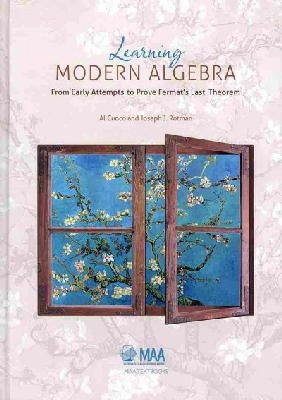
Stock image for illustration purposes only - book cover, edition or condition may vary.
Learning Modern Algebra: From Early Attempts to Prove Fermat's Last Theorem (Maa Textbooks) (Mathematical Association of America Textbooks)
Joseph J. Rotman Al Cuoco
€ 111.97
FREE Delivery in Ireland
Description for Learning Modern Algebra: From Early Attempts to Prove Fermat's Last Theorem (Maa Textbooks) (Mathematical Association of America Textbooks)
Hardcover. A guide to modern algebra for mathematics teachers. It makes explicit connections between abstract algebra and high-school mathematics. Series: Mathematical Association of America Textbooks. Num Pages: 480 pages, illustrations. BIC Classification: PBF. Category: (P) Professional & Vocational; (U) Tertiary Education (US: College). Dimension: 270 x 196 x 29. Weight in Grams: 1092.
Much of modern algebra arose from attempts to prove Fermat's Last Theorem, which in turn has its roots in Diophantus' classification of Pythagorean triples. This book, designed for prospective and practising mathematics teachers, makes explicit connections between the ideas of abstract algebra and the mathematics taught at high-school level. Algebraic concepts are presented in historical order, and the book also demonstrates how other important themes in algebra arose from questions related to teaching. The focus is on number theory, polynomials, and commutative rings. Group theory is introduced near the end of the text to explain why generalisations of the quadratic formula do not exist for polynomials of high degree, allowing the reader to appreciate the work of Galois and Abel. Results are motivated with specific examples, and applications range from the theory of repeating decimals to the use of imaginary quadratic fields to construct problems with rational solutions.
Product Details
Format
Hardback
Publication date
2013
Publisher
Mathematical Association of America
Condition
New
Series
Mathematical Association of America Textbooks
Number of Pages
480
Place of Publication
Washington, United States
ISBN
9781939512017
SKU
V9781939512017
Shipping Time
Usually ships in 7 to 11 working days
Ref
99-1
About Joseph J. Rotman Al Cuoco
Al Cuoco is Distinguished Scholar and Director of the Center for Mathematics Education at Education Development Center, Inc., (EDC). He is lead author for the CME Project, a four-year NSF-funded high school curriculum, published by Pearson. He also co-directs Focus on Mathematics, a mathematics-science partnership that has established a mathematical community of mathematicians, teachers, and mathematics educators. Joseph Rotman has been on the faculty of the mathematics department of the University of Illinois, Urbana-Champaign since 1959, and has been Professor Emeritus since 2004. Professor Rotman was an editor of Proceedings of the American Mathematical Society (1970, 1971) and managing editor (1972, 1973). Aside from writing research articles, mostly on algebra, he has written textbooks on group theory, homological algebra, algebraic topology, Galois theory, and abstract algebra.
Reviews for Learning Modern Algebra: From Early Attempts to Prove Fermat's Last Theorem (Maa Textbooks) (Mathematical Association of America Textbooks)
This book covers abstract algebra from a historical perspective by using mathematics from attempts to prove Fermat's last theorem, as the title indicates. The target audience is high school mathematics teachers. However, typical undergraduate students will also derive great benefit by studying this text. The book is permeated with fascinating mathematical nuggets that are clearly explained." - D. P. Turner, CHOICE "This book is destined for college students in the U.S. who intend to teach mathematics in high school. The reviewer finds it even more apt as a text for algebra courses. Special features in the book are side notes given and printed prominently at the margins of the pages, like: How to think about it, Historical notes, Etymology of notions and words. … The reviewer considers the book a refreshing read among the vast amount of books dealing with similar topics." - Robert W. van der Waall, Zentrallblatt MATH "Although this book is designed for college students who want to teach in high school," its mathematical richness fits it admirably as a text for a first abstract algebra course or a handbook for assiduous students working on their own. While definitions, examples, theorems and their proofs are organized formally, the book is enhanced by substantial historical notes, advice on "how to think about it," marginal comments, connections and etymology that are designed to "balance experience and formality." The book is tightly organized with the goal of elucidating developments leading to the solution of the Fermat conjecture and the theory of solvability by radicals." - E. J. Barbeau, Mathematical Reviews "The primary intended audience of the book is future high school teachers. The authors take great pains to relate the material covered here to subjects that are taught in high school mathematics classes. … In writing this book, the authors have obviously kept the needs of the student reader firmly in mind at all times. The writing style is not just clear; iit is often conversational and humorous. … There are lots of exercises covering a wide range of difficulty, some with hints (but none with complete solutions) and there is a pretty good 39-entry bibliography. … What might be a very interesting use for this book would be as a text for a senior seminar or “topics” course for students who already have some prior exposure to abstract algebra. And, of course, whatever may be the applicability of this book as a text for undergraduate course, it seems clear to me that it belongs in any good undergraduate library." - Mark Hunacek, MAA Reviews
